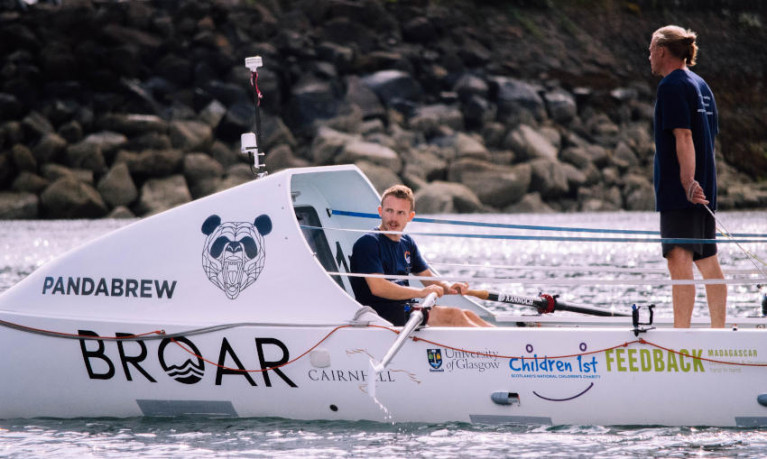Displaying items by tag: Talisker Whisky Atlantic Challenge
‘Row Hard or Go Home’ Teams Raise €35K for RNLI in Ireland to Fund Lifesaving Rescue Work
Four members of Ireland’s Row Hard or Go Home team visited Howth RNLI recently to present a cheque for €35,096 to the lifeboat crew.
The funds were raised through the teams taking part in the World’s Toughest Row (formerly the Talisker Whisky Atlantic Challenge), a 4,800km race across the Atlantic Ocean from the Canary Islands to Antigua earlier this year.
One of the two teams set a new record for the fastest Atlantic crossing, as previously reported on Afloat.ie.
Both teams chose the RNLI and Laura Lynn to benefit from their fundraising efforts. The funds raised for the RNLI will be spent in Ireland and will go towards the search and rescue charity’s work of saving lives at sea.
The ocean rowers were shown around the north Co Dublin lifeboat station by some of the crew. The RNLI operates two lifeboats at Howth, an all-weather vessel and a smaller D-class craft which are on call 24/7.
The Row Hard or Go Home teams spent over a month at sea in some incredibly challenging conditions, away from their family and dry land. They took turns to sleep and eat and carried out repairs on the small boats, miles out to sea.
Commenting on their generous donation, RNLI community manager Pauline McGann said: “We are so delighted… Their race across the ocean, which was followed online by so many people, showed what an incredible journey and feat of endurance they undertook.
“As the RNLI is a charity that saves lives on the water, we know the challenges that being out at sea for so long can raise. They were so strong and so committed to their goal and they raised much needed funds for our lifesaving work in Ireland. We are so grateful they choose the RNLI as one of their charities.”
Derek McMullen, a member of the record-setting crew added: “It can not be understated how important and how invaluable the RNLI are. The dedication and commitment of the volunteers have saved countless lives down through the years and indeed have been there to support us through our own sea going adventures.”
Irish Rowing Crew Set New Record for Fastest Atlantic Crossing
An Irish rowing crew have set a new record for the fastest Atlantic crossing, as RTÉ News reports.
The five-man team from Row Hard or Go Home rowed from the Canary Islands to Antigua in the West Indies in 33 days, 12 hours and 38 minutes as part of the Talisker Whisky Atlantic Challenge.
On arrival in Antigua’s Nelson’s Dockyard on Saturday evening (14 January), the team of Tom Nolan, Diarmuid Ó Briain, Shane Culleton, Gearoid O’Briain and Derek McMullen smashed the previous five-rower transatlantic record by more than two days.
They were greeted on arrival by family and friends after a month at sea to raise funds or the RNLI and Laura Lynn Children’s Hospice.
And they’re not the only Irish interest in the challenge, with a four-rower team also under the Row Hard or Go Home banner still making way with some 100 nautical miles to go, while Jamie Carr is second in the solo rower standings in the mid Atlantic.
RTÉ News has more on the story HERE.
Scottish Brothers Set Trio Of Records In Transatlantic Rowing Challenge
Three brothers from Scotland have set a trifecta of world records after rowing across the Atlantic Ocean in just over a month.
According to BBC News, Jamie, Ewan and Lachlan MacLean are the first three brothers to row any ocean, and the youngest trio and the fastest trio to ever row the Atlantic.
The brothers, collectively known as Broar, took just 35 days and change to row from La Gomera in the Canary Islands to Antigua in the Caribbean — besting the previous record time for a trio by some six days.
They also placed third overall in the Talisker Whisky Atlantic Challenge, in which Irish duo the Salty Pair are hoping to have made their mark this time next year.
BBC News has much more on the story HERE.
























































